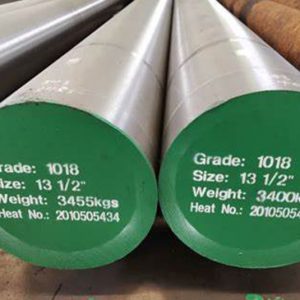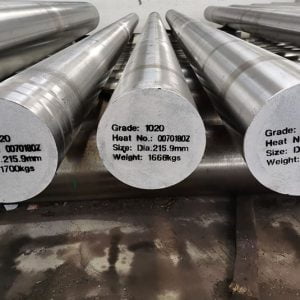Giriş
1018 steel is a widely used material in the manufacturing industry due to its excellent mechanical properties and versatility. Among its key properties, tensile strength is one of the most critical factors that determine its suitability for various applications. This comprehensive guide will explore the 1018 steel tensile strength, its significance, how it compares to other steels, and practical applications. By the end of this article, you will have a thorough understanding of why 1018 steel is a preferred material in many industrial and engineering contexts.
What is 1018 Steel?

Composition and Characteristics
1018 steel is a low-carbon steel with a carbon content of about 0.18%. It is known for its good weldability, machinability, and uniformity of hardness. The chemical composition of 1018 steel includes primarily iron, with small amounts of carbon, manganese, sulfur, and phosphorus. This section will delve into the specific elements that make up 1018 steel and how they contribute to its mechanical properties.
Mechanical Properties of 1018 Steel
The mechanical properties of 1018 steel, including its tensile strength, yield strength, and hardness, make it suitable for a wide range of applications. This section will provide a detailed overview of these properties and explain how they impact the performance of 1018 steel in different contexts.
Importance of Tensile Strength in 1018 Steel
Defining Tensile Strength
Tensile strength is the maximum amount of tensile stress that a material can withstand before failure. It is a critical measure of a material’s ability to perform under load. This section will define tensile strength in detail and explain its importance in evaluating the performance of 1018 steel.
Measuring Tensile Strength
There are various methods for measuring tensile strength, including the use of a tensile test machine. This section will describe the standard procedures for testing the 1018 steel tensile strength and the significance of the results obtained from these tests.
Factors Affecting Tensile Strength
Several factors can influence the tensile strength of 1018 steel, such as temperature, strain rate, and the presence of impurities. This section will explore these factors in detail and discuss how they can affect the performance of 1018 steel in different applications.
Comparing 1018 Steel Tensile Strength with Other Steels
1018 Steel vs. 1045 Steel
While 1018 steel is known for its excellent machinability and weldability, 1045 steel is another popular choice that offers higher strength and hardness. This section will compare the tensile strength of 1018 steel with that of 1045 steel and highlight the key differences and applications of each.
1018 Steel vs. A36 Steel
A36 steel is a common structural steel used in construction and engineering projects. This section will compare the 1018 steel tensile strength with that of A36 steel, discussing the advantages and limitations of each material in various applications.
1018 Steel vs. Stainless Steel
Stainless steel is known for its corrosion resistance and high tensile strength. This section will compare the tensile strength of 1018 steel with that of different grades of stainless steel, providing insights into the scenarios where each material is best suited.
Enhancing 1018 Steel Tensile Strength
Heat Treatment Processes
Heat treatment processes such as annealing, quenching, and tempering can significantly enhance the tensile strength of 1018 steel. This section will explain these processes in detail and how they affect the mechanical properties of 1018 steel.
Cold Working Techniques
Cold working techniques, such as drawing and rolling, can also improve the tensile strength of 1018 steel. This section will discuss the various cold working methods and their impact on the material’s tensile strength and overall performance.
Alloying and Microstructural Control
Alloying 1018 steel with other elements and controlling its microstructure can lead to improved tensile strength. This section will explore the effects of different alloying elements and microstructural modifications on the tensile strength of 1018 steel.
Practical Applications of 1018 Steel
Otomotiv Endüstrisi
1018 steel is commonly used in the automotive industry for components such as shafts, gears, and bolts due to its good machinability and tensile strength. This section will highlight specific applications of 1018 steel in the automotive sector and explain why it is a preferred material.
Construction and Infrastructure
In construction and infrastructure projects, 1018 steel is used for making structural components, fasteners, and machinery parts. This section will discuss the role of 1018 steel in construction and the benefits of its tensile strength in ensuring structural integrity.
Manufacturing and Machinery
The manufacturing industry relies on 1018 steel for making a wide range of machine parts and tools. This section will explore the applications of 1018 steel in manufacturing and how its tensile strength contributes to the durability and reliability of machined products.
Home and Office Equipment
1018 steel is also used in the production of home and office equipment, such as furniture, shelving, and fixtures. This section will discuss how the tensile strength of 1018 steel makes it suitable for these applications and the advantages it offers.
Table: Comparison of Tensile Strength of Different Steels

To provide a clearer understanding of where 1018 steel stands in terms of tensile strength, here is a table comparing the tensile strength of various steels:
| Steel Type | Tensile Strength (MPa) | Uygulamalar |
|---|---|---|
| 1018 Steel | 440 – 670 | General engineering, automotive components |
| 1045 Steel | 570 – 700 | Gears, shafts, machine parts |
| A36 Steel | 400 – 550 | Structural beams, bridges, buildings |
| 304 Stainless Steel | 505 – 750 | Kitchen equipment, chemical processing |
| 316 Stainless Steel | 515 – 860 | Marine applications, medical devices |
| 4140 Çelik | 655 – 1020 | Aerospace, oil and gas drilling equipment |
This table provides a comparative overview of the tensile strength of different steel types and their typical applications, helping you understand the relative performance of 1018 steel.
Conclusion: 1018 Steel Çekme Dayanımı
Understanding the 1018 steel tensile strength is crucial for selecting the right material for various applications. With its excellent machinability, weldability, and moderate tensile strength, 1018 steel is a versatile and reliable choice for many industrial and engineering applications. By comparing it with other steels and exploring methods to enhance its tensile strength, this guide provides a comprehensive overview to help you make informed decisions. Whether you are involved in automotive manufacturing, construction, or general engineering, knowing the properties and applications of 1018 steel can significantly impact the success of your projects.
SSS
What is the tensile strength of 1018 steel?
The tensile strength of 1018 steel typically ranges between 440 MPa to 670 MPa, depending on the specific processing and treatment it has undergone.
How does 1018 steel compare to 1045 steel in terms of tensile strength?
1018 steel has lower tensile strength compared to 1045 steel, which typically ranges from 570 MPa to 700 MPa. However, 1018 steel offers better machinability and weldability.
Can the tensile strength of 1018 steel be increased?
Yes, the tensile strength of 1018 steel can be increased through processes such as heat treatment, cold working, and alloying with other elements.
What are the common applications of 1018 steel?
Common applications of 1018 steel include automotive components, structural elements in construction, machinery parts, and home and office equipment.
Is 1018 steel suitable for high-stress applications?
While 1018 steel offers moderate tensile strength, it may not be suitable for high-stress applications compared to higher-strength steels like 1045 or 4140. However, it is an excellent choice for general engineering and manufacturing applications where moderate strength is sufficient.





